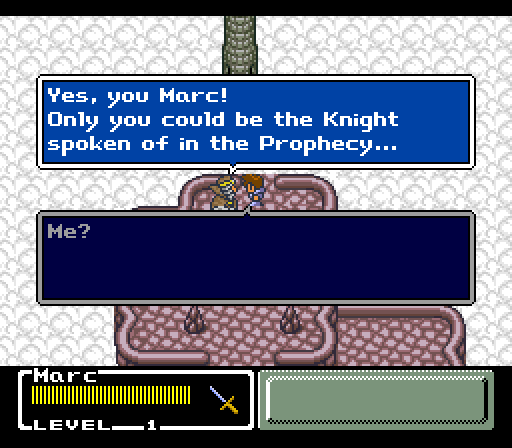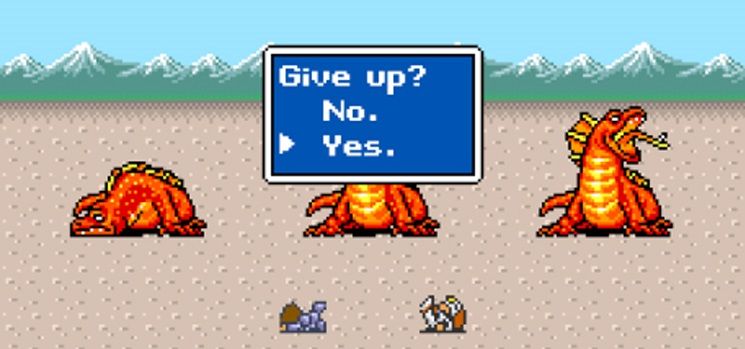Out back of the Hardcore Gamer office you’ll find our Graveyard, where countless long-dead classics lie. We come here to pay our respects, to reminisce, and to wonder aloud what a passing mad doctor might be able do with all these corpses and some high-definition lightning.
It was a dark, lonely day in October of 1992, and American RPG fans had very few ways to feed their addiction. Suddenly, the darkness began to dispel as a shaft of light broke through the clouds. Hope rose up in our hearts. The clouds parted and a new revelation from based Squaresoft graced the land below. Final Fantasy Mystic Quest had arrived! Gamers rushed to stores to get ahold of it, then rushed back home with equal speed so that they could be treated to one of the biggest disappointments of their lives.
In the late '80's and early '90's, Japanese RPGs were not particularly popular in the West. Final Fantasy and the Dragon Warrior games for NES had created a minor cult following in the States, but compared to the "RPGmania" in Japan, it was still an untapped market. The same creative staff responsible for the Game Boy's Final Fantasy Legend 3 took the helm on a new project designed specifically with the western audience in mind. Under Squaresoft of America's guidance, the team worked tirelessly to Americanize the series formula and create a game that would be known in Japan as Final Fantasy USA.
Chihiro Fujioka, who had previously been the sound designer and producer for Final Fantasy Legend 2, penned simplistic, straightforward story that would be translated by Ted Woolsey, well-known for his work on Secret of Mana and Final Fantasy II (the western version of IV, that is). Despite their combined efforts, Mystic Quest's script is the weakest of any Squaresoft game. In summary: a reluctant hero named Benjamin is sent a quest by an old wise man. He must restore power to the world's elemental crystals and defeat an ultimate evil. This same plot skeleton has been used for most of the Final Fantasy games, but there's no meat on it here. The story is devoid of interesting twists, entertaining characters, or anything noteworthy.
FFMQ strips away several of the elements that made Final Fantasy IV such a success. Gone is the freedom to explore a world map, replaced with a Super Mario World-esque board where your main character simply trots automatically between locations. Random battles have also been eliminated in favor of fixed "battle spots" on the board-map. After about ten fights in a particular spot, it is removed from the map and you are usually rewarded with a small prize such as a new piece of armor or an accessory. This leads me to something more concerning: the complete lack of Weapon and Armor shops. Character customization is as fixed as experience gain, with all new equipment either found in dungeons or received from random NPCs.
What FFMQ does offer is a mixture of action-game elements, such as the ability to use and switch between different weapon types that can be used outside of battle. An axe obtained early on can cut down trees, a claw can be used to climb up walls, bombs can obliterate obstacles, and Benjamin can even leap over gaps with a press of the B-button. While these are great additions on paper (Golden Sun would benefit greatly from its inclusion of such elements), they quickly become tedious gimmicks because they're never used for real puzzles and instead serve as mandatory keys for doors in the area where you find them.
The battle system is un-fun, toning down the already simplified mechanics and style from Final Fantasy Legend 3 even further. Your HP is set to appear as a life gauge by default, and MP is non-existent. Like weapons and armor, magic spells are found in treasure chests or given to you by other characters as you progress. The use of magic is set to a limited amount based on your level, similar to the first Final Fantasy. The basic healing spell restores so much of your health, even late in the game, that it completely nullifies the use of items. On top of all this you are allowed only one party member at a time, and they are always stronger than you even when you surpass them in level. Your party member is set to take actions of their own volition, dealing out area-effect spells and curing you should you get poisoned, so they're basically a glorified babysitter. In development his might have seemed like a good way to accommodate American simpletons, but in practice it's boring as hell.
RPG difficulty generally scales depending on how much time you spend grinding and tweaking your character, but FFMQ requires no strategy whatsoever. You can literally mash A through every battle. If you actually do manage to die (and you have to be REALLY trying to do that), there's no penalty whatsoever - you can just immediately re-fight the battle.
Final Fantasy Mystic Quest's one unequivocal strong point is its soundtrack, scored by Yasuhiro Kawakami and Ryuji Sasai. As a spinoff from the main series, Nobuo Uematsu did not contribute to Mystic Quest, and he left some big shoes to fill. The composing duo created a potent mixture of somber ballads and '80s-inspired hard rock-. A chorus of distorted electric guitars and keyboards shreds away in the game's battle theme, while the various town themes create a serene atmosphere. This is the first Final Fantasy game to make use of such varied styles of music, and it has aged remarkably well. Thankfully, you can get the soundtrack on its own.
FFMQ was released on October 10 of 1992 in North America. A year later was released as Final Fantasy Mystic Quest Legend in the European market alongside the Game Boy's Final Fantasy Adventure, which was oddly retitled Mystic Quest. It received largely negative reviews from American outlets, and fell far short of Square's sales projections. Western fans found the game to be unnecessary at best and outright insulting at worst. To make matters worse, FFMQ's failure led to the cancellation of Final Fantasy V's localization. Reactionary European fans later chose to import FFV rather than purchase its mediocre cousin.
While FFMQ is a fairly bland game, it made a vital contribution to the development of the Japanese RPG. It serves as a prime example of how not to give a game broader appeal, though it had a few strong concepts. Squaresoft would later reintroduce some of the same ideas (like monsters wandering the overworld and battle skills being used to navigate) more successfully in games like Super Mario RPG (ironically directed by FFMQ's Fujioka), and the legendary Chrono Trigger. Square would ultimately find the broader audience they were looking for with Final Fantasy VII, a game that challenged with both its writing and mechanics. The recent failure of Final Fantasy XIII (which bears a lot of similarity to Mystic Quest) and the comparable success of Bravely Default demonstrate that gamers can still tell the difference between making a genre more accessible and dumbing it down.



